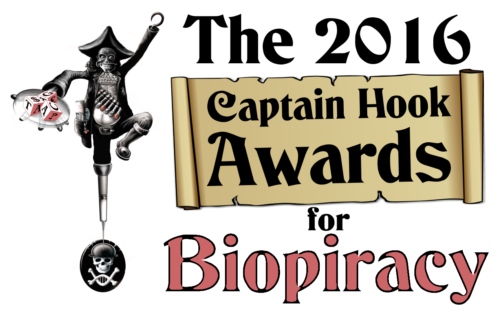 The Coalition Against Biopiracy (CAB) will host the 6th Captain Hook Awards ceremony at the Thirteenth Conference of the Parties (COP13) to the Convention on Biological Diversity (CBD) in Cancun, Mexico, 4-17 December 2016.
The Coalition Against Biopiracy (CAB) will host the 6th Captain Hook Awards ceremony at the Thirteenth Conference of the Parties (COP13) to the Convention on Biological Diversity (CBD) in Cancun, Mexico, 4-17 December 2016.
This award ceremony comes as high-tech ‘digital’ biopiracy is becoming easier than ever. With the accelerating tools of genome-editing and synthetic biology, today’s biopirates no longer need to carry their booty offshore in boats and airplanes – they can swiftly upload DNA as digital sequences in one location and then recreate it as synthetic DNA on the other side of the planet. As the CBD meets to discuss what to do about Synthetic Biology it’s high time to take on the new cyberthieves of the biodiversity commons.
Previous Captain Hook Award winners have included:
- In 2014 the UK and Canada received a “Pirates Cove” award for sheltering the syn bio industry and aggressively promoting the industry’s interests at CBD’s COP 12.
- The World Intellectual Property Organization (WIPO) won the 2004 honour of “Worst International Convention” for proposing a new global patent system to facilitate a one-stop shop for exclusive monopolies.
- Synthetic biology pioneer Craig Venter has won the lifetime achievement award.
Previous Cog Awards have honoured:
- In 2008, the “Best Organized Advocacy” Award was given to Filipino / Philippine civil society organizations, fisherfolk and individuals who stood up for the Sulu Sea
- Percy Schmeiser, a Canadian farmer, won the 2004 honour of “Best Advocate” for defending Farmers’ Rights in the field and the courts
- COMPITCH and other indigenous peoples’ organizations in Mexico won in 2002 for defeating the US government’s $2.5 million bioprospecting project in Chiapas.
See here for full lists of previous winners.
About Biopiracy
For the first time, the Oxford English Dictionary now includes “biopiracy,” The OED defines “biopiracy” as “bioprospecting, regarded as a form of exploitation of developing countries.”
Biopiracy refers to the monopolization of genetic resources such as seeds and genes taken from the peoples or farming communities that have nurtured those resources. It also refers to the theft of traditional knowledge from those cultures.
Today the main source of biopiracy occurs by corporations, academic institutes and governments claiming intellectual property over genetic resources – patents on life (eg gene patents) or claiming plant breeders rights. The introduction of new biotechnologies such as genetic engineering has facilitated a new wave of biopiracy.
With the advent of nanotechnology ownership of nature has now reached a more fundamental level. As well as gene sequences, nanopirates are claiming ownership of the molecules and even the elements that everything is made from.
Meanwhile the culture industry has been commercially exploiting the art, culture, language and symbols of indigenous cultures – often claiming trademarks on knowledge which they have stolen.
For some Biopiracy only refers to the unauthorised and illegal theft of knowledge and resources, claiming that legal bioprospecting agreements can be worked out to share commercial benefits. The Convention on Biological Diversity (CBD) takes the view that agreements can be made on “access and benefit sharing” to overcome biopiracy. Many Indigenous groups disagree:
“Contractual benefit sharing is like waking up in the middle of the night to find your house being robbed. On the way out the door, the thieves tell you not to worry because they promise to give you a share of whatever profit they make selling what used to belong to you.” – Alejandro Argumedo, Quechua activist
Check out wikipedia’s definition of Biopiracy
For an introduction to Biopiracy and the state of global discussions check out this briefing from ETC Group
